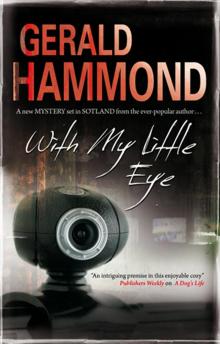- Home
- Gerald Hammond
The Unkindest Cut
The Unkindest Cut Read online
Contents
Cover
Recent Titles by Gerald Hammond from Severn House
Title Page
Copyright
Chapter One
Chapter Two
Chapter Three
Chapter Four
Chapter Five
Chapter Six
Chapter Seven
Chapter Eight
Chapter Nine
Chapter Ten
Chapter Eleven
Chapter Twelve
Chapter Thirteen
Chapter Fourteen
Chapter Fifteen
Chapter Sixteen
Chapter Seventeen
Chapter Eighteen
Chapter Nineteen
Chapter Twenty
Chapter Twenty-One
Chapter Twenty-Two
Epilogue
Recent Titles by Gerald Hammond from Severn House
COLD IN THE HEADS
CRASH
DOWN THE GARDEN PATH
THE DIRTY DOLLAR
A DOG’S LIFE
FINE TUNE
THE FINGERS OF ONE FOOT
FLAMESCAPE
GRAIL FOR SALE
HIT AND RUN
THE HITCH
INTO THE BLUE
KEEPER TURNED POACHER
LOVING MEMORY
ON THE WARPATH
THE OUTPOST
A RUNNING JUMP
SILENT INTRUDER
THE SNATCH
THE UNKINDEST CUT
WAKING PARTNERS
WELL AND GOOD
WITH MY LITTLE EYE
THE UNKINDEST CUT
Gerald Hammond
This ebook is copyright material and must not be copied, reproduced, transferred, distributed, leased, licensed or publicly performed or used in any way except as specifically permitted in writing by the publishers, as allowed under the terms and conditions under which it was purchased or as strictly permitted by applicable copyright law. Any unauthorised distribution or use of this text may be a direct infringement of the author’s and publisher’s rights and those responsible may be liable in law accordingly.
First published in Great Britain and the USA 2012 by
SEVERN HOUSE PUBLISHERS LTD of
9–15 High Street, Sutton, Surrey, England, SM1 1DF.
This eBook edition first published in 2016 by Severn House Digital an
imprint of Severn House Publishers Limited
Copyright © 2012 by Gerald Hammond.
The right of Gerald Hammond to be identified as the author of this work has been asserted in accordance with the Copyright, Designs & Patents Act 1988.
British Library Cataloguing in Publication Data
Hammond, Gerald, 1926–
The unkindest cut.
1. Highsmith, Jane (Fictitious character) – Fiction.
2. Fellowes, Ian (Fictitious character) – Fiction.
3. Scotland – Fiction. 4. Detective and mystery stories.
I. Title
823.9’14-dc23
ISBN-13: 978-0-7278-8177-9 (cased)
ISBN-13: 978-1-84751-443-1 (trade paper)
ISBN-13: 978-1-78010-795-0 (ePub)
Except where actual historical events and characters are being described for the storyline of this novel, all situations in this publication are fictitious and any resemblance to living persons is purely coincidental.
This ebook produced by
Palimpsest Book Production Limited,
Falkirk, Stirlingshire, Scotland
ONE
Jane Highsmith and Roland Fox had long been neighbours in Birchgrove, a hamlet which consisted of a cluster of small houses designed for first-time buyers, near the southern fringe of Newton Lauder, a little town south of Edinburgh and close to the boundary between moorland and the fertile plain of the Scottish Borders. The pair had started out as friendly neighbours who bade each other good morning or evening and occasionally shared a glass of wine together at convivial moments. Their relationship had progressed slowly, mainly as a result of Roland’s sudden realization that he found Jane extremely attractive and had begun looking forward to bumping into her during the day – and he had even engineered the odd meeting if he was honest with himself. So, once he’d made the decision that he wanted something more from their neighbourly relationship, he made his feelings clear and managed to win Jane round to the same way of thinking.
They then spent a few pleasant years enjoying a happy and far from platonic relationship until what had been Jane’s family home fell to her on the departure of her older sister Violet, together with her husband, to take up a joint post in Dublin. Violet was a skilled perspective artist while her husband was an equally skilled architectural model maker. Their skills, which complemented each other, led to their being headhunted by the architects to a huge and continuing project. This relieved the stress of a long-term sibling war. The house, Whinmount, was a spacious and solitary but comfortable old house on a byroad that came off the B-road east from Newton Lauder and led almost nowhere that anybody gave a damn about, through farmland and birch woods and heath.
It was a pleasantly secluded and rural location. In summer, when the deciduous trees were in leaf, they had cloistered privacy with only the occasional dog walker or passing car to disturb them. However, in winter, when only the conifers stood up dark against the bright countryside, they could see the roofs of Newton Lauder, the fields around and the moors above. So they had the desired privacy, but company, if wanted, was never too far away.
With Jane inheriting the house, it would, they decided, be a good time to marry. Despite this pragmatic approach to the topic of marriage and lifelong commitment, Jane made clear that she still expected to be ‘proposed to’ in the traditional way. Since both her parents had long since died, and her great-grandfather GG had passed away a few years ago, there was no one to ask for the permission of her hand in marriage – and she certainly was not going to allow Roland to extend that responsibility to her sister Violet or her husband – but she still wanted to be actually asked, which was fair enough really despite how emancipated she felt. So, Roland good-naturedly did the deed one beautiful spring day, soon after they’d moved into Whinmount, whilst out on an early-morning walk. They were both suitably attired for such an activity in their wellies and Barbour jackets, but on such a dew-soaked morning Roland’s right trouser knee got very damp as a result of the obligatory position he’d crouched in whilst popping the all-important question. Needless to say, Jane accepted with a tear in her eye and they could move on to the next phase of their lives.
These lives of theirs were swiftly progressing in the right direction: Jane was in the process of taking over the local veterinary practice, her own smaller set-up having far outgrown its humble beginnings; Roland’s second novel had been accepted for publication; they would have the two small houses to let; and Jane had begun to suspect that she might be pregnant. They managed to ignore the other side of the coin – that Jane had had to find a substantial sum for the purchase of the practice while Roland would not see more than a cautious advance against the earnings of his book for more than a year ahead. However, Roland’s other source of income was as amanuensis and rewrite-man to his friend and fellow writer, Simon Parbitter. Jane also had money to come from the sale of a Raeburn picture that she had inherited with the house, but the sale was taking its time. ‘You can’t hurry these things if you want full value,’ she was told over and again. And the experts were still arguing as to whether the Raeburn was genuine or ‘school of’. The truth, Roland suspected, was that it was, as usual, a bit of both.
As in recent times, the philosophy of the moment was that if you waited for something until you could afford it you would still be
awaiting it on your deathbed. With the Micawberish optimism of the comparatively young they knew for a fact that British law would not permit them to starve. Tomorrow was always a lovely day. The sword of Damocles might have hung by a chain rather than a thread.
A wedding need not be expensive, they told each other. A few pounds to the local registrar, a notice in the local rag and the job’s done.
So they thought.
They had reckoned without the many locals who they had not realized were also their friends. Roland might be a comparative newcomer but he was well known and well liked and Jane’s great-grandfather had been a much loved local citizen, especially by the ladies. Much of his popularity had rubbed off on Jane, who had lived her whole life in the town and, having a sunny temperament and an obliging nature, made friends galore. As soon as the news spread about their impending nuptials, they found that large numbers of the locals not only wanted to know when the event was to take place but expected to be invited to it. A stronger-minded couple might have returned from their honeymoon to present the locality with a fait accompli, but they were not so cunning or practical.
Help was at hand. Not financial help – there was not a surplus of money in the neighbourhood and they were too proud to accept handouts from wealthier friends except in one or two very special circumstances. But Roland and Jane had each been living a shoestring existence, supplementing their meager incomes with what they could grow or shoot or catch by rod, or sometimes, it must be admitted, abstract overnight from the well-filled gardens of others. They had also brought to a fine art the claiming from supermarkets at cut-throat prices the goods that were within a few hours of passing their sell-by dates. So they were, on the whole, well versed in the art of being creatively economic with what they could afford.
Jane, as a veterinary assistant, had been well known and liked by the animal owners round about. She was popular with the locals of her generation – she had been at school with most of them. She was nice-looking, pretty verging on beautiful, and she had a ready laugh with a turn of wit that made her welcome in most company. She had given unstinting service, especially to farmers, and was admired and respected by all she came into contact with in her professional role as the local vet. Consequently, the pair received many offers of meat or vegetables as gifts or at silly prices towards the accumulation of the wedding feast. The chef at the local hotel was one of the few people who could afford to feed a Great Dane on scraps left by the clientele and Jane had nursed the huge dog through a crisis of pyometra. He offered to cook the wedding breakfast for them. And so it went on.
Jane was offered the loan of a half-dozen wedding dresses, one of which was bound to fit her. Jane went by invitation to Hay Lodge, the most opulent house for miles around, to try one on. She dreaded the prospect of not liking the dress on offer, worried it was going to be some frumpy, overly ruffled and lacey Victorian concoction, but she needn’t have concerned herself about that. The fit was perfect and the dress was fit for a duchess with a delicately gathered corset on the top half and opulently hooped skirt on the bottom. It was certainly vintage, but so timeless in its intricate design and style that no prospective bride could possibly turn down the chance of wearing such a piece of finery.
‘I’ll be almost scared to wear it,’ she told Mrs Ilwand, the owner of the house and previous wearer of the dress in question.
‘Nonsense,’ said the lady briskly, running her hand over the ivory silk with obvious pleasure. ‘I know you’ll take good care of it or I wouldn’t be lending it to you. My grandmother was married in it and so was my mother and so was I, but I’ll never have a daughter now and you were very good to me whenever any of my menagerie had to be put down. It’s the least I can do.’
‘Two dogs and a cat,’ Jane said, laughing. ‘Big deal! But I will be careful. I really appreciate your generosity – it’s such a beautiful dress …’
‘The pet you have at any particular time is invariably special. You were always a great comfort, knowing just the right thing to say.’ Mrs Ilwand gave the dress one last loving stroke and handed it over with just a hint of regret in her eyes; more for the lack of her own daughter to wear it than any regret at offering it to her, Jane hoped.
Problems seemed to be solving themselves, but one of the largest obstacles was the subject of alcohol. Their chance of buying champagne for such a crowd of people was, at best, nil. However, Jane was a lady of many talents. She could shoot as well as most men, ride a horse or a bicycle, speak tolerable French and, if the situation justified it, swear. She did a lot of swearing around that time.
None of her other talents was required at the moment; but, almost forgotten, was a knack of making excellent wines including in particular an elderflower champagne that was often voted at least as good as the genuine article. Newton Lauder was favoured in that the countryside suited the elder tree, Sambucus nigra, which spread and formed whole areas of woodland behind the hospital. The snag was that there would be no elderflowers until almost the longest day. Roland had had it in mind to marry just before the end of the tax year, thus obtaining tax relief for the whole of the year just past, but simple calculation proved that neither of them would be liable for much, if any, tax for the current year. So June the twentieth became fixed, which gave them a few months to solve the other associated problems.
The entire project would have become impossible and the couple might have been forced to return to the simpler format that they had first envisaged, except that there was a ready-made source of facilities almost on their doorstep.
Mrs Ilwand’s father, Sir Peter Hay, a wealthy benefactor of the whole area, had been much concerned about the lack of facilities to lead the up-and-coming generation away from mischief and into what he called ‘creative adventure’. With the changes to modern agriculture favouring larger units, small farms were being joined with neighbours and some groups of farm buildings were becoming redundant. Sir Peter had founded Kempfield in what had been the farm of that name and had bequeathed the buildings to the community. The activities that had germinated there had been dictated by a combination of the demand, exemplified by the desires of the young and not so young of the town and environs, and the availability of an experienced professional to give a lead in each subject.
The late Luke Grant, great-grandfather to Jane and her sister Violet, was always known to the girls as GG for short, and in the reasonless way that such things happen, he had become generally known by that abbreviation. GG had been an early and enthusiastic supporter of Kempfield and on his death Jane had taken over his seat on the management committee and the leadership both of the photographic section and of several projects devoted to the care and training of animals.
Once the seed was sown, Kempfield had continued to grow. A building contractor, Lance Kemnay, had discovered that theft and vandalism on his building sites had almost vanished now that the young could find something better to do with their time and so he had become an enthusiastic supporter, always willing to help out with gifts of materials or help with labour. This bread that he cast on the waters returned manifold because in the process of preparing and extending Kempfield and other buildings that fell to them many youngsters discovered in themselves a knack for some aspect of the building industry and the contractor had found that he had a source of keen, talented and well-behaved apprentices. This in turn appeased the local union representatives who might otherwise have damned the whole project.
Thus, Jane, and Roland with her, had access to a pool of friendly and energetic help with premises to use. While they waited for the elder trees to blossom they had plenty to occupy them. Contrary to male misconceptions, weddings do not organize themselves. They still had their livings to earn. And while elder buds prepared to pop into blossom they had to gather up all the other materials.
Premises entailed much work but little difficulty. By good luck a house on Moorfoot Reservoir was purchased by a family who had no particular use for the boathouse but whose eldest son was desperate
to refurbish his vintage Norton motorcycle. There was a section at Kempfield, headed by a retired panel beater, devoted to vehicle restoration; the section devoted to building and sailing racing dinghies moved out to Moorfoot and volunteers began a major clean out of the former boatbuilding workshop.
After the elderflowers, when they ripened, the rest of the materials were readily obtainable. The tools were a different matter. Winemaking kits were on the market by the dozen but not on the scale required. Approaches to the British wine industry were discouraging; evidently, competition was not to be welcomed. A local dairy had recently converted from churns to tanks and would be delighted to lend them stainless steel churns with tight-fitting lids and clamps, but tanks … no.
It was not in Jane’s nature to admit defeat. Approach enough people and one of them will have what you want; that at least was her philosophy.
TWO
Before buying the small but established veterinary practice, Jane had made many friends by treating, in her kitchen, sick animals beloved by the townsfolk. However, now she had set her face against perpetuating the sharing of her kitchen with such informal veterinary practice. Most clients were accustomed to bringing ill or injured animals to Mr Hicks’s clinic and, reluctant though she was to saddle herself with a rent which, though modest by today’s standards, would be quite a burden on her stretched finances, Jane could not be confident that her purchase of the goodwill and the client list would necessarily compel the clientele to transfer their loyalty. As part of the deal for taking over the vet’s practice on that individual’s retirement, therefore, she had taken over his rented surgery in the town square.
Habits, once formed, by their nature tend to persist. Most of the former clients had continued to visit the same address and contact the same phone number and, of those, most seemed delighted to escape her grumpy and abrasive predecessor. It seemed that many of these were in the habit of settling their bills in cash and Jane was pleasantly surprised to find that the reported fee income on which, in accordance with custom, the purchase price had been based, had been depressed for tax reasons – a practice that she was pleased to continue. This seemed to be generally understood. The philosophy of tax evasion had been brought to a fine art by the thrifty Scots.

 Home to Roost
Home to Roost A Dead Question
A Dead Question Twice Bitten
Twice Bitten The Curse of the Cockers
The Curse of the Cockers In Loving Memory
In Loving Memory Illegal Tender (Three Oaks Book 12)
Illegal Tender (Three Oaks Book 12) Cold Relations (Honey Laird Book 1)
Cold Relations (Honey Laird Book 1) A Brace of Skeet
A Brace of Skeet Silver City Scandal
Silver City Scandal Sauce For the Pigeon
Sauce For the Pigeon Cold Relations
Cold Relations Hook or Crook
Hook or Crook The Curse of the Cockers (Three Oaks Book 5)
The Curse of the Cockers (Three Oaks Book 5) Snatch Crop
Snatch Crop Sting in the Tail (Three Oaks Book 6)
Sting in the Tail (Three Oaks Book 6) A Dead Question (Honey Laird Book 2)
A Dead Question (Honey Laird Book 2) In Loving Memory (Honey Laird Book 3)
In Loving Memory (Honey Laird Book 3) Thin Air
Thin Air Sting in the Tail
Sting in the Tail Pursuit of Arms
Pursuit of Arms The Game
The Game Give a Dog a Name (Three Oaks Book 4)
Give a Dog a Name (Three Oaks Book 4) Fair Game
Fair Game The Executor (Keith Calder Book 10)
The Executor (Keith Calder Book 10) Whose Dog Are You? (Three Oaks Book 2)
Whose Dog Are You? (Three Oaks Book 2) Mad Dogs and Scotsmen (Three Oaks Book 7)
Mad Dogs and Scotsmen (Three Oaks Book 7) Cousin Once Removed
Cousin Once Removed The Worried Widow
The Worried Widow A Shocking Affair
A Shocking Affair Dead Weight (Three Oaks Book 11)
Dead Weight (Three Oaks Book 11) Whose Dog Are You
Whose Dog Are You The Revenge Game
The Revenge Game With My Little Eye
With My Little Eye Doghouse (Three Oaks Book 3)
Doghouse (Three Oaks Book 3) In Camera
In Camera Bloodlines (Three Oaks Book 8)
Bloodlines (Three Oaks Book 8) The Unkindest Cut
The Unkindest Cut